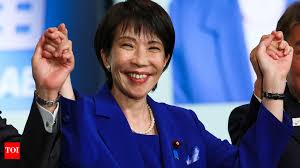Japan Elects First Female Prime Minister

- 22 Oct 2025
In News:
- Recently, Japan’s National Diet elected Sanae Takaichi as its new Prime Minister, making her the first woman to hold that office in the nation’s history.
- Her ascent comes amid a shifting political backdrop, as the long-governing Liberal Democratic Party (LDP) lost its outright majority and secured a coalition with the Japan Innovation Party (Ishin).
Her appointment is notable not only for the gender milestone but also for signaling a potential policy shift—especially in Japan’s defence, economy and Indo-Pacific diplomacy.
Structural & Governance-Related Aspects
- Japan is a parliamentary constitutional monarchy. The Prime Minister is the real executive authority and is accountable to the lower house (House of Representatives).
- Her government is a minority coalition: the LDP formed an alliance with the Japan Innovation Party after the LDP-Komeito coalition collapsed. Thus, the new administration lacks a comfortable majority and will face legislative challenges.
- Despite her historic election, her cabinet contains only two women, raising questions about the depth of the gender-breaking moment for Japanese politics.
Key Challenges Ahead
- Economic recovery – Japan faces slow growth, inflationary pressures and demographic headwinds. Takaichi has pledged stimulus measures along the lines of previous “Abenomics”-style policies.
- Defence & security – With rising regional tensions, she is expected to push for higher defence spending and deeper coordination with the U.S. and Quad partners. Her first face-to-face diplomatic test includes welcoming U.S. President Donald Trump.
- Gender & social policy expectations – While she broke a barrier as Japan’s first female PM, her conservative positions on issues like same-sex marriage, imperial succession and women’s representation have drawn criticism.
- Policy implementation in a fragmented parliament – With no clear majority, passing major reforms will require coalition-building or compromises with opposition parties, marking a potential shift from LDP’s dominance.
Significance for India and the Indo-Pacific
From the Indian perspective—relevant to GS Paper II on International Relations—Takaichi’s election holds importance:
- Japan remains a key partner for India in the Indo-Pacific region, including in frameworks such as the Quad and supply-chain resilience initiatives.
- Her commitment to stronger defence and security cooperation with allies resonates with India’s own strategic concerns in the Indo-Pacific maritime domain.
- A stable, assertive Japan aligns with India’s interest in sustaining a free, open and rules-based maritime order.
